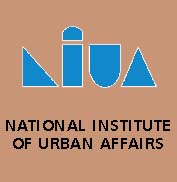/topics/governance
Governance
Integrated approach to solid waste management in Pune city – A working paper in MPRA
Posted on 31 Aug, 2011 07:02 PMSolid waste is increasing in the city due to growth of population, urbanization, higher per capita income and standard of living, changing lifestyle and food habits.
The first section of the paper explains about the structure of the solid waste in the city. The solid waste according to its constituents is presented in the second section. The third section of the paper explains about the regression result. The last section deals with the policy implication and conclusion.
Social equity and integrated water resources management – A background paper by Global Water Partnership
Posted on 31 Aug, 2011 04:10 PMIt provides an analytical framework that policy makers and water professionals can use to bring greater clarity to the issue of social equity in their local context.
NIUA invites applications for post of Editor and Research Analyst – Apply by October 27, 2011
Posted on 30 Aug, 2011 02:31 PM
National Institute of Urban Affairs (NIUA), a premier autonomous Institute for urban research, training and information dissemination, urban development and management supported by the Ministry of Urban Development (MoUD), Government of India, invites applications for the following posts -
Sowing Seeds 2011 invites artist & critics for international village residency at Rajasthan – Apply by September 30, 2011
Posted on 30 Aug, 2011 08:53 AM

Kaman Art Foundation’s aim is to identify, promote and celebrate the community's artistic and cultural identity and support community-based festivals, exchanges and events, as well as to bring to the community the art and culture of other communities in order to broaden their experiences and appreciation of the artist.
HREA invites applications for short certificate courses in human rights – Apply by September 1, 2011
Posted on 28 Aug, 2011 10:22 AM![]()
Human Rights Education Associates (HREA) is an international non-governmental organisation that supports human rights learning; the training of activists and professionals; the development of educational materials and programming; and community-building through on-line technologies. HREA is dedicated to quality education and training to promote understanding, attitudes and actions to protect human rights, and to foster the development of peaceable, free and just communities.
Groundwater quality assessment of Jharia coalfield area in West Bengal - A case study in NISCAIR
Posted on 27 Aug, 2011 06:35 PMThis case study in National Institute of Science Communication and Information Resources (NISCAIR) by the Central Institute of Mining and Fuel Research (CIMFR), Dhanbad and the Geo-Environment Division (Environment Management Group) deals with groundwater quality assessment of Jharia coalfield area of West Bengal. The physiochemical characteristics of groundwater of the upper catchments of the coalfield were studied to evaluate the water quality.
IDRC invites research awards for training in research management and grant administration – Apply by September 12, 2011
Posted on 27 Aug, 2011 11:10 AM![]()
International Development Research Centre (IDRC) supports applied research to find local solutions that will have lasting impacts on communities around the world.
The IDRC research awards aim to provide exposure to research for international development through a program of training in research management and grant administration under the guidance of IDRC program staff.
This competition is for positions starting in early 2012. The number of awards varies each year. Approximately 15 awards will be offered in 2012.
Restructuring of the Central Water Commission – Ministry of Water Resources invites comments on its proposal till September 30, 2011
Posted on 25 Aug, 2011 12:24 PM
The restructuring is being proposed primarily to adopt river basins as the fundamental block for integrated planning, development and management of water resources in the country.
Groundwater, self-supply and poor urban dwellers - A review with case studies of Bangalore and Lusaka by IIED
Posted on 24 Aug, 2011 08:32 PMIt investigates the difficulties they face and emphasizes the need for better integration of groundwater in the planning and management of urban water resources.
Boundary concepts for interdisciplinary analysis of irrigation water management – A working paper by Peter Mollinga
Posted on 24 Aug, 2011 07:16 PMThe focus is concepts that capture the hybridity of irrigation systems as complex systems, and cross the boundaries of the natural and social sciences.





